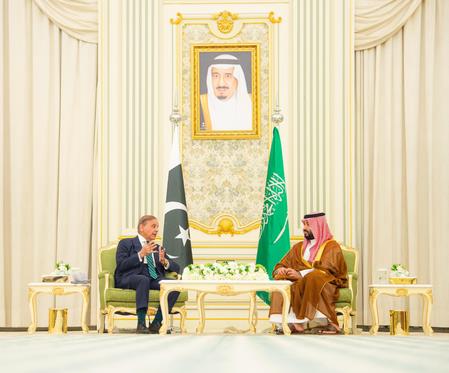Saudi Arabia-Pakistan Pact Showcases Asymmetric Alliance As 'Junior Partner' Bears Heavier Load: Report
On September 17, Saudi Arabia and Pakistan signed defence agreement in Riyadh, declaring that "any aggression against either country shall be considered an aggression against both. Pakistan's Defence Minister Khawaja Asif reportedly also told media outlet that Saudi Arabia could get access to Pakistan's nuclear programme, if required, after the signing of the agreement.
"With the pact, Pakistan stands to gain economically - Saudi investments could alleviate Islamabad's chronic balance-of-payments woes - and politically, as the pact signals Riyadh's enduring commitment amid Pakistan's balancing act between the US, China, and the Muslim world. Yet, the expectations appear tilted toward Pakistani contributions. Pakistan has deployed troops to Saudi Arabia during past crisis, such as the 1979 Grand Mosque seizure and Yemen conflicts, and could do so again to safeguard the kingdom's oil fields or holy sites. In a worst-case scenario involving an Iranian or Israeli attack, Islamabad might even extend its nuclear umbrella to Saudi Arabia, besides conventional forces. Conversely, Saudi reciprocity may fall short," Nitin J Ticku wrote in an opinion piece for The EurAsian Times.
Citing experts, the author noted that the agreement is "more symbolism than substance," a political move against the US' reducing influence in the Middle East instead of a blueprint for mutual sacrifice.
"If Pakistan faced an existential threat - such as escalation along the Line of Control with India - Saudi intervention would likely be limited to diplomatic support or financial aid, not boots on the ground. The parallels between Russia-North Korea and Saudi-Pakistan pacts are uncanny, revealing a pattern in asymmetric alliances where junior partners bear the heavier load. Both North Korea and Pakistan, with troubled economies but powerful militaries, leverage their might to secure patronage from resource-rich allies," wrote Ticku.
"Russia extracts military and munitions from Pyongyang to sustain its war machine; Saudi Arabia gains a nuclear backstop from Islamabad to deter Iran and Israel, while mainly offering economic lifelines in return. This dynamic echoes Cold War-era pacts, like the US-South Korea alliance, but inverted: here, the 'senior' partner (Russia/Saudi) dictates terms from a position of relative strength, leaving the junior one exposed," he mentioned further.

Legal Disclaimer:
MENAFN provides the
information “as is” without warranty of any kind. We do not accept
any responsibility or liability for the accuracy, content, images,
videos, licenses, completeness, legality, or reliability of the information
contained in this article. If you have any complaints or copyright
issues related to this article, kindly contact the provider above.
Most popular stories
Market Research

- New Cryptocurrency Mutuum Finance (MUTM) Raises $15.8M As Phase 6 Reaches 40%
- Bydfi Joins Korea Blockchain Week 2025 (KBW2025): Deepening Web3 Engagement
- Yield Basis Nears Mainnet Launch As Curve DAO Votes On Crvusd Proposal
- 0G Labs Launches Aristotle Mainnet With Largest Day-One Ecosystem For Decentralized AI
- Ethereum-Based Defi Crypto Mutuum Finance (MUTM) Raises Over $16 Million With More Than 720M Tokens Sold
- Fintech's Gender Gap In Focus: Drofa Comms' Women Leading The Way Joins Evolvh3r's She Connects At TOKEN2049






















Comments
No comment